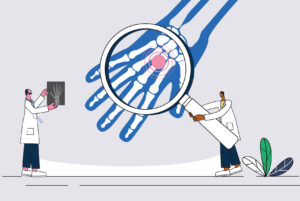Data Literacy – The New “Table Stakes” for Business
Today’s data-driven society dictates the future of business. As we immerse ourselves into a world of analytics, trends, and intel, proper data literacy becomes imperative for leaders in any organization. Knowing the right etiquette can make all the difference in the way your company operates.
October 9, 2023

Data serves a vital purpose for all stakeholders in the insurance industry. The catalyst for judgment calls and action plans, data is of the utmost importance for just about every process and initiative. Gathering key information helps cultivate the way professionals respond to specific claims. Analyzing predictive trends helps influence strategic motives. Most of all, data keeps us abreast on all matters, providing critical details that can help identify opportunities and risks.
Today, data is the most accessible it has ever been. A simple click of a button can generate information instantaneously, and with developments in artificial intelligence emerging, extracting data becomes virtually effortless. The problem is, how do we know what to trust?
“Data, like ethics, is transitional,” said Bill Wilkins, Vice President and Chief Risk and Analytics Officer at Safety National. What was permissible at one point in time is not necessarily permissible at another. When measuring data, it is important to know what the information represents historically while having the awareness to decipher its present-day meaning. Data does not always surface in real-time to a situation. You have to be proactive in your thought process in how you look at data, how you use data, and how it transitions.”
With such an ease of intel at one’s disposal, our priorities in managing and optimizing data are more important than ever before.
What Is Data Literacy, and Why Does It Matter?
No society will function effectively without literacy. While, traditionally, this applies to proficiencies in reading, math, and other technical abilities, there is no exception in the digital world.
Data literacy is the ability to understand, work with, analyze, and communicate terms of data. This skill empowers all workers at every level to ask the right questions, build knowledge, and strategize effectively. Being able to read and understand data helps drive opportunities for businesses across various industries.
With more data-literate employees in the workforce, the better a business will hold up over time. Ultimately, a staff with great data literacy is primed to contribute greater value in their roles, thus helping the organization recognize and avert risks while simultaneously maintaining a competitive edge.
Ethical Implications When Relying on Data
When making a business decision, leaders must strike the right balance between data literacy and ethics.
Leaders, particularly in the insurance industry, are having trouble grappling with evolving trends in technology. AI should not hold us back. Skepticism around machine learning is on the rise, but proper comprehension of the tools can help simplify jobs, boost productivity, and enhance day-to-day operations. AI simply helps synthesize data faster, not replace livelihoods.
Bottom line – we are never going to see a slowdown in evolution. If anything, an uptick is around the corner. A changing dynamic is inevitable, but being able to learn from previous data can help us as we press forward in today’s tech revolution.
Fostering Literacy at an Executive Level
Using data is a pivotal skill set, especially for those in higher-level positions. Data is more than just a table of statistics or a sitting list of figures. It is practical information, and the best leaders find ways to apply it to everyday scenarios. A successful executive never stops learning and searches for opportunities to put the latest details into business practices.
Good practitioners worked at becoming literate. Not only do they have a baseline foundation of ethics, they have learned to use new information to enhance what they already know. Pragmatic and calculated casework is the best way to prove a data’s efficacy.
The goal is to harvest results, so as a leader, data literacy becomes an essential business practice.

























